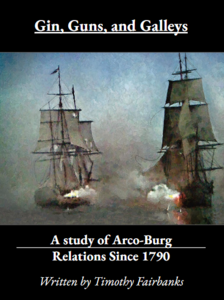Gin, Guns, and Galleys: Difference between revisions
m very hesitantly including this as an award winner |
m Text replacement - "Category: Award winning pages" to "Category: 2022 Award winning pages" |
||
| Line 7: | Line 7: | ||
[[Category: Politics of Burgundie]] | [[Category: Politics of Burgundie]] | ||
[[Category: Award winning pages]] | [[Category: 2022 Award winning pages]] | ||
[[Category: IXWB]] | [[Category: IXWB]] | ||
Revision as of 12:46, 29 December 2022

Gin, Guns, and Galleys: A study of Arco-Burg Relations Since 1790 (also published as Arco-Burg in Crona, A History) is a 1992 transdisciplinary non-fiction book by Arcer author Timothy Fairbanks. It is a critically acclaimed novel across Ixnay, and winner of multiple prestigious historical research and literary awards. Several unsucessfully attempts have been made to turn the book into a documentary or historical fiction television series.
The book attempts to explain why two dissimilar nations, Arcerion and Burgundie, have maintained a staunchly close relationship despite numerous wars, commercial interest clashes, and international incidents involving the two nations, and not always in the same faction. The main argument is that the natural resources, mutual interests, and complementary strengths, in addition to cultural and political realties such as an emphasis on capitalism and active conflict against communism played a major role in cementing the two nations as a key international partnership.
Fairbanks argues that the access Arcerion had to Crona's natural resources, in particular wheat and agriculture, combined with the strong maritime mercantile empire establish by Burgundie was the initial foundation, and prosperous efforts from commercial interests on both sides continued to reinforce the bond. Concurrent to this, fighting on the same side during the First and Second Great Wars, a mutual participation in each other's national security issues and espousing common casue on ma number of key global issues like humanitarian casues, freedom of the seas, and the establishement and maintenance of global organizations (e.g. LON, World Bank, International Red Cross, etc.), have created an interesting international bond.